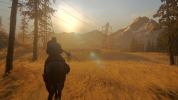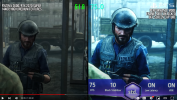Nah, you've gone and taken the other extreme of this position which is also ridiculous. TLOU Pt1 is decent looking, but it's not even actually next gen, visually. It's like a small step up from TLOU2 and little more.
Again, something like Plague Tale Requiem looks pretty clearly better.
I can't speak to whether APT is 'clearly better', but a big part of the critique with how TLOU PT1 performs on the PC is how it compares visually to TLOU2. You can of course select cut-scene screenshots (real-time in both games) and wide scenery shots from TLOU PT1 that no doubt look great, part of that due to being a decent distance away from some of the more weaker texturing, but also just because there are some extremely talented artists involved and laborious attention to detail.
But here's TLOU Part 2. 1440p max so they're at a disadvantage out of the gate, but this is a game that can produce these visuals while running on a Jaguar CPU + 1060-class GPU (in the case of the Pro) and streaming from a 5400rpm laptop HDD. It will run these at a locked 60 - from that same laptop HDD - on a PS5, restricted to the same working ~5GB total memory set. The levels in this game are
larger, sometimes significantly so, than PT1.
This is what's not computing for some people. Yes, PT1 looks better, primarily in texturing and skin shaders. But in so many aspects they are so,
so close (again, with smaller levels) and it can achieve that on a system that has a glacially slow I/O system tied to a much smaller memory pool by comparison.
You can argue that's irrelevant if the game's streaming was built from the ground up for the PS5, but the end results are what people are going to pay attention to, not the technical underpinnings. All this points to that this game isn't really doing something that's necessarily indicating it is
impossible to do on a system that doesn't have the exact PS5's I/O architecture, the very existence of TLOU2 running on hardware a world apart from the PS5 indicates that it is, in fact, largely possible - it's just that it wasn't done in this case for the PC.




Aren't you doing the same thing? You can claim it is a small step up from tlou2 but tlou2 and part 1 are still some of the best looking games on the market. Even if you want to argue about plague tale which I would, it's still one game. Out of how many?
That's the point though - TLOU1's visual quality is often used as a defense for the hardware requirements it requires on PC. A Plague's Tale is being used as a counterpoint to that, how it can look like it does but require far less. TLOU2 argues that position as well, and I would say more strongly, as it comes from the same studio and is looking like that on even weaker hardware.








